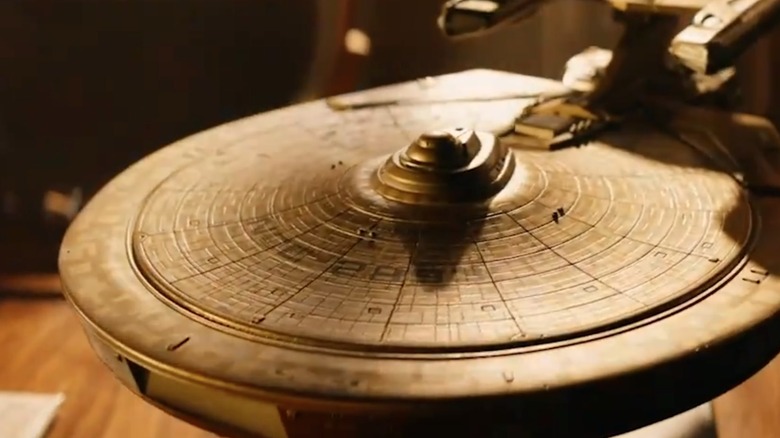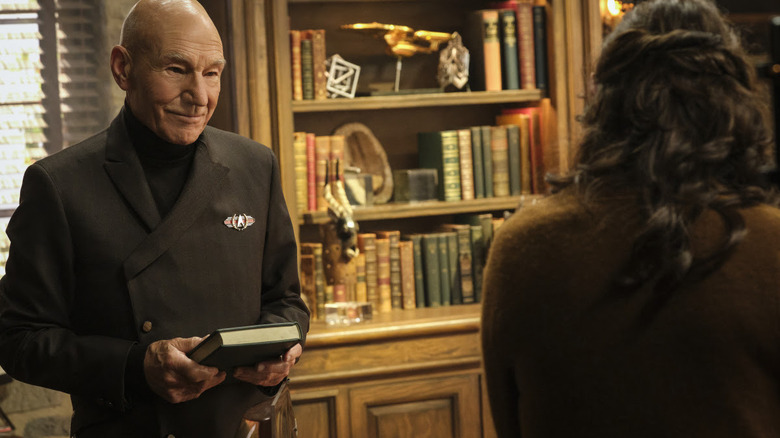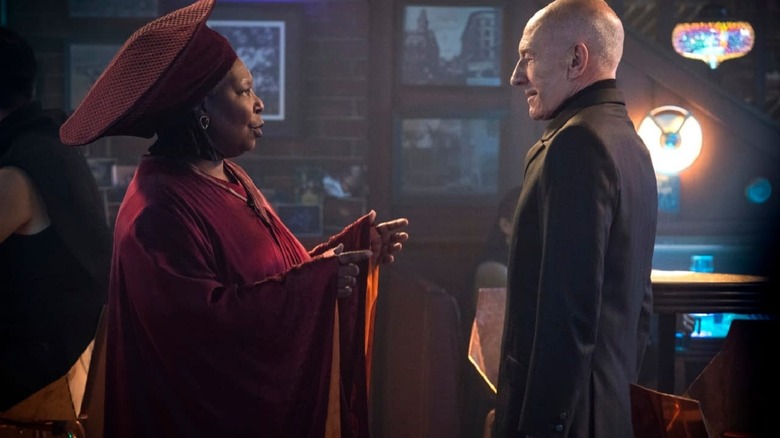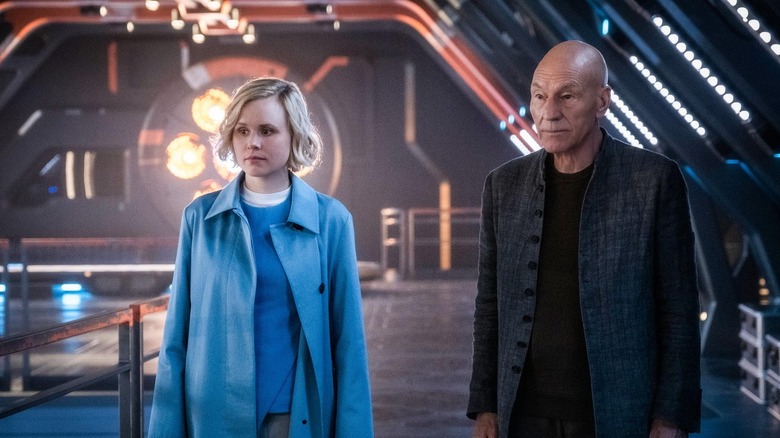Star Trek: Picard Season 2 Lays A Strong Foundation In 'The Star Gazer'
The first season of "Star Trek: Picard" was, not to put too fine a point on it, a blithering mess. The showrunner's insistence on an ill-thought-out mystery box-like story, along with their frustrating propensity to turn every single character into a violent murderer, made for a "Star Trek" that was equal parts clunky and inappropriate. The stern, calm, and diplomatic character of Jean-Luc Picard was reduced to a supporting player in an action-packed catastrophe-based torture show about a dark android conspiracy to open an aperture to another dimension and release a poorly-defined robot Cthulhu into the galaxy to kill off all organic life. There was no wit or well-worn "Trek"-like intelligence to the show, and the showrunners' need to depart from familiar "Star Trek" settings led audiences so far afield that "Picard" almost needn't have been a "Star Trek" show at all.
The coda — that Picard's consciousness was shunted into an android body — was just one of several scientific conceits that kind of removed all palpable rules from "Star Trek," very much in the way that a teleporting ship on "Star Trek: Discovery" removed the trekking from "Star Trek," or the cross-galaxy transporter from 2009's "Star Trek" removed the need for starships altogether. We can move dead people's minds into robot bodies? Great, now death has been handled. We can clone robots using their positronic brains? How does that work, exactly? And if the Zhat Vash wanted to destroy all artificial life in the galaxy, wasn't their plan ... incredibly stupid?
From my endless whinging, a reader might intuit that I approach the second season of "Star Trek: Picard" with a truckload of skepticism. Make that a whole convoy of skepticism. There was little reason to believe that the second season wouldn't lean into the same type of broad, vague mystery plot as the first season while continuing to forget that "Star Trek" gains strength from plot clarity, mission-based stories, and a concerted effort to avoid violence and murder. What a relief, then, to discover that the first episode of the second season of "Star Trek: Picard" — called "The Star Gazer" — is not just a marked improvement, but almost a 180-degree course correction.
There will be no more Picards
The first season of "Picard" — set about 20 years after the events of "Star Trek: Nemesis" — began with the new conceit that The Federation had devolved into something a little bit more sinister and xenophobic, having deliberately refused to help the Romulans during a major planetary crisis (clearly meant as a metaphor for both Brexit and the intolerance of Trump's America). Picard (Patrick Stewart) had left Starfleet in protest and trekked through the events of the season without Starfleet's imprimatur or aid. From a storytelling perspective, this forced Jean-Luc Picard to act as a free agent, and allowed audiences to see what sort of action he would take while out of uniform. Thematically, it merely played into unexplored ideas of intolerance that were never addressed or undone, except to show that intolerance may lead to one releasing a robot Cthulhu into the galaxy.
The second season mercifully seems to have ignored the conceit that the Federation is now intolerant, getting back to a more comforting, familiar place where the Federation can stand as a peaceful and hopeful organization once again. Indeed, seemingly fast-forwarding a few years, all the characters appear to be starting in a place of professional stability. Capt. Rios (Santiago Cabrera) is now a uniformed captain of a starship again. Dr. Jurati (Alison Pill) was cleared of the murder charges and has her job back. Raffi (Michelle Hurd) is back in uniform and is now wondering if she'll have an opportunity to date Seven of Nine. And Elnor (Evan Evagora) has just recently graduated from Starfleet Academy (the flags at the graduation ceremony even reveal that Bajor and the Klingons have become members of the Federation). Even Soji (Isa Briones) seems to have landed a cushy gig as a diplomat, as we see her having a fancy dinner with a group of Deltans (Ilia's species from "Star Trek: The Motion Picture"). Only Seven of Nine (Jeri Ryan) is in a dark place, as she's still essentially a violent space adventurer, although in her introductory scene she is fighting off evil pirates and delivering much-needed cargo to a planet in need — a very "Star Trek" thing to be doing. Picard, meanwhile, is back at his vineyard, happily tending to the grapes, only occasionally putting on his Admiral's uniform to address graduating Starfleet cadets. Everything, in short, is hunky-dory.
Except, we see, Picard's encroaching mortality and pervasive loneliness. With the series starting in a familiar, comfortable place, the audience is allowed to see what the characters are really like, rather than just charging headlong with them into crisis situations. As such, we are able to revisit a notion about Picard first mentioned in "Star Trek: Generations": That he is the last of his family. Picard's brother and nephew burned to death in a fire in "Generations" and we saw later that one of Picard's ultimate fantasies was to merely have a home full of children and a loving wife. Picard is now "hovering around a century" in age, and after all but admitting romantic feelings toward his longtime roommate/servant Laris (Orla Brady), Picard finds that he is looking forward to his twilight years alone. This is already a far deeper look at Picard than anything in season one.
A foundation of personal crisis
To stress Picard's loneliness, he goes to visit Guinan (Whoopi Goldberg), who is still alive, and who has only aged the tiniest amount — Guinan's species is incredibly long-lived. Ignoring the very dumb notion that she is a bartender at a building located at 10 Forward Ave. (le sigh), Guinan does have insight into Picard enough to point out that he never filled his heart. Indeed, throughout "Star Trek," Picard sported an artificial heart (thanks to a barfight with Nausicaans when he was a recent Academy graduate), and now he has an entirely artificial body. The lack of love and romance in Picard's life, we can accept, has become a detriment.
With an emotional backstory firmly established, and a setting that should feel lived-in to Trekkies, only now are we welcome to spin the story into wild places. The second season of Picard does something very vital to the fabric of any TV show, and especially to the strength of any series debut: Establish a status quo. I don't care who you are in a crisis. Who are you every day? What sorts of things do you care about on a micro level? As such, when the Borg rip the universe a new space-hole, we understand who and where our characters are in relation to each other before they attend to the crisis.
It's so simple, and yet so necessary. It makes the show stronger.
The story
About that space hole. The story of season 2 kicks off when a colossal negative space wedgie appears in the sky and — mysteriously — asks for Picard by name in a loud, strange, metallic voice. Picard gathers a few members of the cast and goes to investigate in Capt. Rios's ship, The U.S.S. Stargazer. The Stargazer was, as Trekkies will recall, the name of the first ship that Picard commanded before his stint on the Enterprise. It won't be the only reference to gazing at the heavens. A Borg ship appears through the space hole and a mysterious Borg — lacking a face and cloaked like a "Hellraiser" cenobite — begins assimilating the ship and taking over an entire fleet via remote (an ability not previously seen from the Borg). The conflagration leads to a massive explosion! ... and Picard wakes up in his bed at home.
But ... it's not his home. Laris is not there, he has a robot slave, he's in a black uniform, and there are weapons all over his home. Then, surprisingly, "Star Trek"'s own trickster god Q (John de Lancie) appears out of nowhere. Q, an immortal being, handily ages himself up to John de Lancie's age in real life, and explains that Picard is now undergoing another test to suss out humanity's ability to move beyond fascism; such tests are Q's bread and butter. "Welcome to the very end," Q says, "of the road not taken." Mysterious, intriguing, and rife with fan service without being precious about it.
Weapons? Picard in a military uniform? Is Picard in a timeline rife with fascism? Surely setting the second season of "Picard" in a universe that succumbed to fascism — while staying close to a timeline where we seem to have narrowly avoided it — is a political statement of the post-Trump era. Things may be getting "back to normal" in the Biden sense, but how close is that "normal" to an alternate fascist timeline? Perhaps closer than we think.
Regardless, the show has set a strong foundation, and we'll have to eyeball that political metaphor closely as we move forward.



